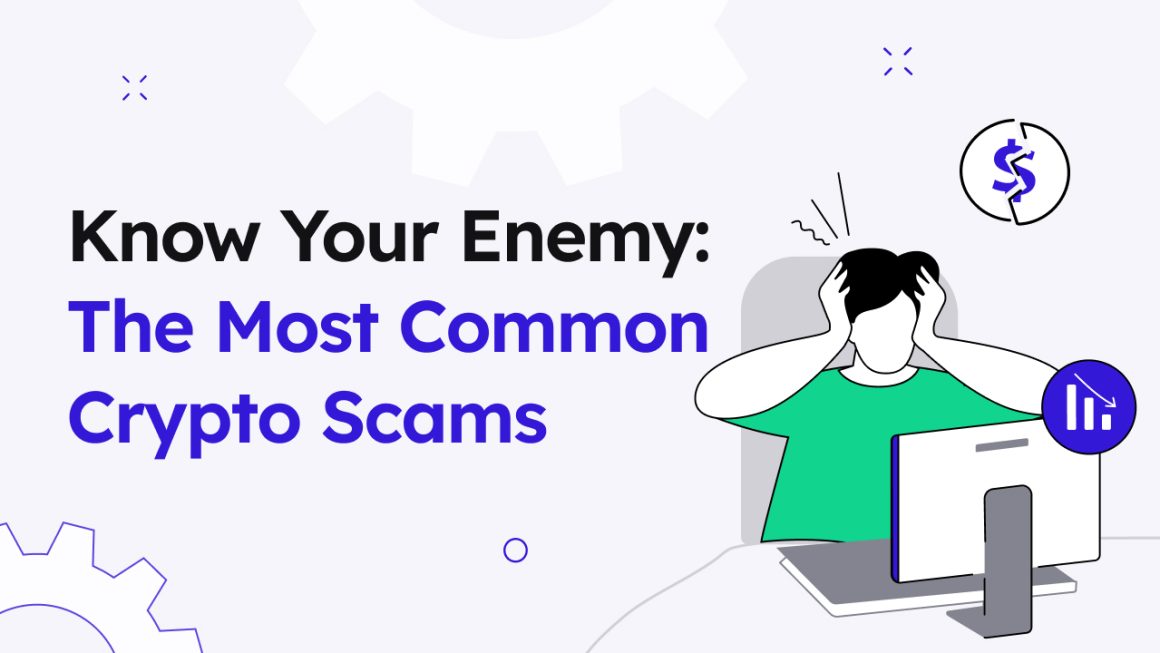Cryptocurrencies have rapidly grown in popularity in recent years, attracting millions of investors worldwide. They have also attracted scammers, swindlers, hackers, and cyber criminals. As part of traversing the world of cryptocurrency, it is essential to educate yourself on the most common scams and how to stay safe.
Without further ado, let’s get into one of the most widely used scams not just in crypto, but on the internet as a whole.
The phishing scam
Phishing scams are fraudulent attempts to obtain sensitive information, such as usernames, passwords, credit card numbers, or other personal information. They disguise themselves as legitimate entities or individuals.
These scams are often carried out through email, social media, or other online platforms, and are designed to trick unsuspecting victims into divulging their personal information.
Phishing scams can be quite convincing and are often difficult to spot, even for seasoned investors. The scammer may use various tactics, such as social engineering or spoofing, to make their fraudulent messages look legitimate.
One example of a phishing scam is an email from a hacker posing as a CEX or DeFi wallet representative, asking the recipient to click on a link and enter sensitive information in return for “maintenance”, “an airdrop”, or other very “legitimate” reasons. The link takes the victim to a fake website that looks like the project’s website, but is actually a clone designed to steal the victim’s information.
Phishing scams can also be carried out through phone calls or text messages.
The scammer will often use the logos and branding of the real service, making it difficult to differentiate the fake from the real.
How to stay safe from phishing scams
To protect yourself from phishing scams, it is essential to be vigilant and take proactive steps to safeguard your personal information.
This includes being cautious when clicking on links in emails or messages, especially if they are unsolicited or from an unknown sender. Better yet – don’t click at all. You should also check the service’s website address carefully and ensure that it is the correct one.
Also, does the sender seem… phishy? What about the domain it was sent from? These are all giveaways.
Additionally, using two-factor authentication, strong passwords, and keeping your software up to date can all help to minimize the risk of a phishing attack.
Fake ICOs
Fake ICOs are a serious problem, where scammers take advantage of the hype and excitement surrounding new blockchain-based projects. These fake ICOs are designed to trick investors into parting with their hard-earned money by posing as legitimate projects and soliciting investments.
Fake ICOs often have impressive websites and flashy marketing materials that make them appear legitimate. However, upon closer inspection, investors may notice red flags such as a lack of a detailed whitepaper or information on the team behind the project.
In some cases, the scammers may even create fake social media profiles and reviews to make the project seem more credible. Also, it is not uncommon to use photos of celebrities to push a scam – do not fall for it.
How to stay safe from fake ICO scams
To avoid falling victim to a fake ICO in the crypto world, it is essential to do your due diligence and research the project thoroughly before investing. This includes reading the whitepaper, examining the team behind the project, and looking for independent reviews from reputable sources. Additionally, be wary of any promises of high returns, as these are often a red flag for a scam.
Read here: How to properly research a crypto project
If you are still unsure about the legitimacy of an ICO, consider reaching out to the team behind the project. You may want to consider consulting with a trusted financial advisor or crypto expert. Using third-party platforms for scam identification can also help. By being vigilant and doing your homework, you can significantly reduce the risk of falling into a fake ICO.
Rug pulls
Rug pulls are a type of scam that is unfortunately all too common in crypto. This type of scam involves a cryptocurrency project, often a new one, that suddenly and unexpectedly collapses, leaving investors with worthless tokens and a loss of their investments.
Rug pulls typically involve a group of developers who create a new cryptocurrency project, usually with promises of high returns and innovative technology. However, once they have raised a significant amount of money from investors, the developers suddenly disappear, taking the investors’ money with them.
In some cases, the “developers” may also engage in market manipulation, artificially inflating the price of the token before selling off their own holdings and crashing the price.
How to stay safe from rug pulls
To avoid becoming a victim of a rug pull in the crypto world, it is important to be cautious and do your research before investing. Things like reading the project’s whitepaper, researching the team behind the project, and looking for independent reviews from trusted sources are a must. Additionally, be wary of any promises of high returns, as these are often a red flag for a scam.
Another way to protect yourself from rug pulls is to diversify your investments and not put all of your money into a single project. This can help to minimize the impact of a potential scam and reduce your risk of losing all of your investments.
Ponzi Schemes
Ponzi schemes are a type of fraud that has been around for decades, but they have unfortunately found a new home in crypto. In a Ponzi scheme, the scammer promises high returns to investors and pays early investors with the funds of new investors. No actual profits are generated through legitimate means.
In the crypto world, Ponzi schemes often involve fake investment opportunities, where scammers claim to have insider knowledge or access to new technologies that will generate massive returns. They may also use complex trading strategies or other investment methods to make their scheme seem more credible.
How to stay safe from crypto ponzi schemes
To avoid falling victim to a Ponzi scheme, always doubt promises for high returns with little risk. Be wary of any investment that requires you to recruit new investors, as this is often a sign of a Ponzi scheme. Additionally, be sure to research the investment opportunity thoroughly, including the background of the team behind the project, before investing any money.
If you do become a victim of a Ponzi scheme in the crypto world, it is important to report it to the authorities and seek legal assistance as soon as possible. While it may be difficult to recover your funds, taking action can help prevent others from falling victim to the same scam.
Social media giveaway scams
Social media giveaway scams in the crypto world are a type of fraud that has become increasingly common in recent years. These scams involve scammers posing as well-known individuals or companies in the cryptocurrency space. They will offer free cryptocurrency or other rewards in exchange for participation in a social media giveaway.
The scam often involves asking users to send a small amount of cryptocurrency to a wallet address in order to participate in the giveaway, with the promise of receiving a larger reward in return. However, once the user sends their cryptocurrency, they never receive the promised reward, and their funds are lost to the scammer.
To avoid falling victim to a social media giveaway scam in the crypto world, it is important to be skeptical of any offers that seem too good to be true. Be sure to verify the identity of the person or company offering the giveaway. Also, never send any cryptocurrency or personal information to anyone you do not trust or do not know.
Reporting suspected social media giveaway scams to the relevant social media platform is something you can also do.
Pump and dump scams
Pump and dump scams in the crypto world are a type of fraud that involves artificially inflating the price of a cryptocurrency through coordinated buying and then selling off the asset for a profit. These scams are often organized by groups of individuals or organizations with large amounts of capital. They work together to manipulate the market and profit at the expense of other investors.
In a pump and dump scam, the group behind the scheme will typically hype up a particular cryptocurrency through social media or other channels. Exaggerated claims about the asset’s potential value or technological capabilities are a sure sign. The goal is to cause the price of the cryptocurrency to soar, as FOMO kicks in and other investors rush in to buy. But remember what Elvis said about rushing in.
Once the price has been artificially inflated to a certain point, the group behind the scheme will then sell off their holdings. This causes the price to plummet and leaves other investors with significant losses.
How to stay safe from pump and dump scams in crypto
To avoid falling victim to a pump and dump scam in the crypto world, it is important to be cautious and skeptical – always. Any hype or hype-driven price movements in the market should raise concern. Be sure to do your own research and analysis of any cryptocurrency you are considering investing in and be wary of any claims that seem too good to be true.
Additionally, be sure to report any suspected pump and dump schemes and warn others.
Celebrity endorsement scams
Now, there are two different types of scams featuring celebrities.
One is entirely fake, as in that the famous person has not given consent to be featured on some random cryptocurrency’s social media profiles. This type of celebrity crypto scam is actually the more easily recognizable and more easily avoided. It usually takes no more than 5 minutes of research and going around the internet to find out if one such endorsement is real or not.
The second type is worse – actual celebrities doing actual promotion of actual cryptocurrencies. Everything is official and real, it’s the real Matt Damon, real Kim Kardashian, whatever. The thing is this – these celebrities don’t know a thing about crypto, tokenomics, blockchain, or DeFi. They were paid handsomely to promote the projects with a no questions asked attitude. That’s where their affiliation comes from – and where their responsibility ends.
The crypto space is littered with failed projects that used celebrities for endorsements – and in some cases this has resulted in litigation and class-action lawsuits for misleading investors.
So, as a rule of thumb, remember – celebrities mean nothing, and their endorsements mean nothing. A bad project is bad even if advertised by the most celebrated of celebities. Do not fall for them.
Final thoughts
Cryptocurrency scams are rampant and waiting behind every corner, and it is essential to educate yourself on the most common types and how to avoid them. Always research any investment opportunity thoroughly, verify the legitimacy of websites and services, and be wary of any promises of high returns with little or no risk. By following these tips, you can protect yourself from falling victim to cryptocurrency scams and safely invest in this exciting and rapidly evolving industry.






